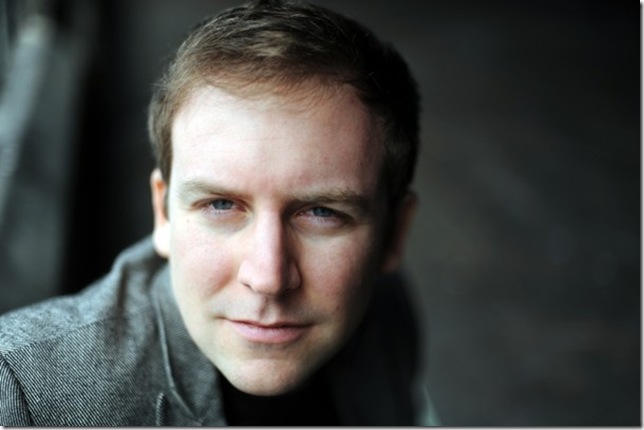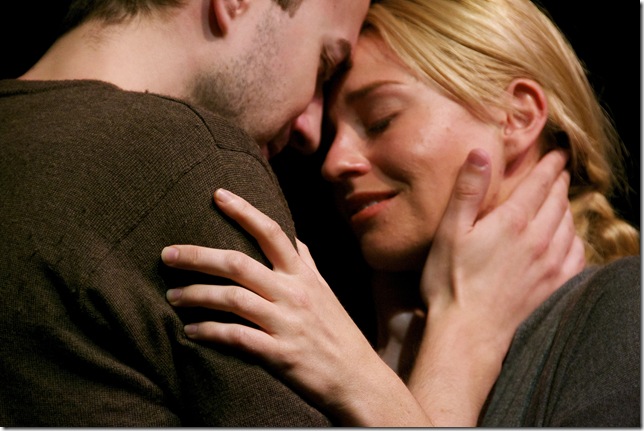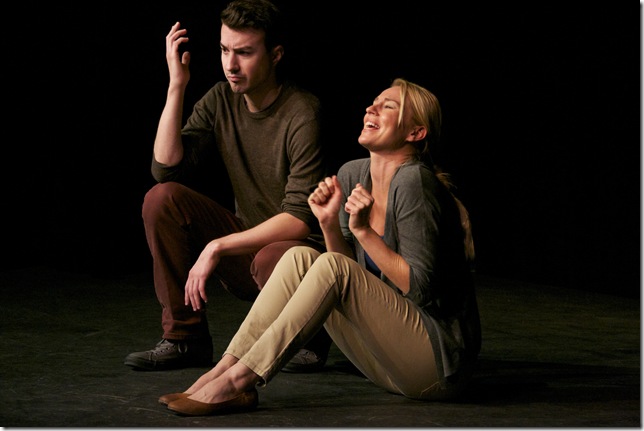Rising British playwright Duncan Macmillan is gaining considerable attention and productions with his seriocomic play Lungs, now playing at The Theatre at Arts Garage through April 14.
In it, we eavesdrop on a couple, M. (Cliff Burgess) and W. (Betsy Graver), contemplating having a child, but concerned about bringing one into a world of global anxiety and political unrest. We spoke with Macmillan, who’s 32, by phone from his home in London,
Erstein: What was the first impulse that got you writing Lungs?
Macmillan: I was getting bogged down on a writing project and I needed to shift gears. I sort of wanted to write something for my own pleasure, in a way. Nothing that was a commission for anywhere. I didn’t know if it was going to go on anywhere. I just wanted to enjoy writing some dialogue, write something that was a challenge and a gift for actors.
I know enough actors of that age group, which is my age. I thought, “At the very least I could give it to a couple of actors, we could spend a couple of weeks on it and we could put it in a pub theater somewhere.”
Erstein: How did you begin?
Macmillan: I just started writing at 11 o’clock one night, having not really planned to, and I found myself writing through the night. I wrote the first draft very, very quickly, pretty much overnight.
Erstein: Where did the idea for the play come from?
Macmillan: I’d been thinking for a while, because I teach as well, trying to articulate what is dramatic onstage. I’d been thinking that drama is essentially live decision-making. Yes, of course we’re interested in scene, we’re interested in character and in story, but actually what we want moment to moment is we want to see characters making difficult decisions over time.
Erstein: And did the decision you wrote about parallels one you were making in your own life?
Macmillan: Right. I was approaching 30 and my partner and I were trying to get a mortgage on a flat, trying to get on the property ladder. I felt like the baby conversation was very much in the air and the idea of suddenly being a grown-up was terrifying. It was also the time of the volcano in Iceland and there was very, very heavy snowfall around that time as well. And it was the beginning of the Arab Spring and there were riots surrounding that. The world was absolutely going to hell. My generation was sort of inheriting this world which is completely broken.
Erstein: So the play is essentially autobiographical?
Macmillan: These are my anxieties, absolutely, but maybe pushed to an extreme in some cases or articulated in a way that I wouldn’t choose to. It’s not about me and my wife by any means. In many ways I’ve got more in common with the woman in Lungs than with the man.
Erstein: Your characters do seem to talk like you.
Macmillan: It’s true, they have this urgency in the way they speak and they speak in a very improvisatory and self-editing way. They don’t often finish sentences and they interrupt one another and misunderstand one another. They’re working out how they feel about the world as they’re listening to themselves talking about it.
I’d seen a run of plays where people speak in full sentences and articulate themselves exactly. That’s just not how I live my life. So I was interested in having characters wrestle with things and self-edit as they go along, and surprise themselves and each other.
Erstein: From a reading of the script, I find your female character, W., to be pretty unlikable. Is that intentional?
Macmillan: Yeah, that’s a funny thing. I hear that a lot. We did a very interesting thing early on, we did a reading of the play in New York and a lot of the feedback was, “We don’t really like her character very much.” Because she says all these unpleasant things or mean things to him.
So I changed everything that wasn’t gender-specific in what was physically happening to her or him. I swapped them over and all the feedback afterwards was, “We don’t really like her very much.” I think fundamentally we are very attuned to criticize and judge women far more harshly than men.
Certainly there has been more criticism of her character than there has of his. Which I find really fascinating. I think we’re programmed as a culture to find men who need a bit of mothering, or a bit more instruction in how to behave, I think we find them more lovable. A guy who hasn’t quite grown up, he doesn’t really know what he is doing, he doesn’t really know how to talk to women, but actually he’s adorable and all he really needs is for the woman to work harder.
Erstein: In the way that men and women see most things differently, because men are from Mars and women from Venus, do you find that men and women react differently to the play?
Macmillan: No, not at all really. It’s funny, the first reviews of the play all mentioned Men Are From Mars, Women Are from Venus, which I’ve never read. But I certainly didn’t want to generalize about the sexes, and say “Men behave like this” and “Women behave like that.” I think I’ve made a bit of a mistake by calling one of the characters M. and the other one W., which you only know if you read the script. I don’t think they’re supposed to represent gender archetypes.
There’s no way of generalizing how different people have reacted to it and what they’ve taken from it. It’s all over the map.
Erstein: You specify that productions of Lungs have no scenery or props. What do you have against them?
Macmillan: Good question. Nothing. The play I’m writing at the moment is full of scenery and props. For me, (Lungs) was about the conversation. And so to have a realistic set, or have them do costume changes or have them put talcum powder in their hair to age up, it seemed to be drawing attention to the wrong thing. Similarly if there were a light or sound cue to signify a change in location, that didn’t seem to make any sense.
That came out by accident really, borrowing conventions from writers I really admired. But writing it so quickly, I think I was interested in the conversation and not how it was going to be staged. When I looked at it the next morning, I decided I didn’t need to write in “Interior, bedroom.”
Erstein: Without your writing any stage directions or other notes, you put a lot of trust in the directors of your play. How is that working out?
Macmillan: On the whole, I think the directors that have gravitated towards it and the theaters that have wanted to program it and the actors who have wanted to do it understand the gesture of it, they understand the high-wire act that it requires and they’re up for the challenge of that.
It needs to be somewhere between a ballet duet and a wrestling match and a stand-up gig. And the two actors have got to be controlling everything.
Erstein: Being in your early 30s and writing for your generaton, has Lungs been able to attract young theatergoers? That is an ongoing challenge in South Florida.
Macmillan: It’s a challenge for us over here, too, in many ways. Lungs is like 85 minutes straight through like many films, and it’s funny, I think, I hope. Most of the productions have been funny. And it’s got rude words in it. So everywhere it’s played, I think it’s found younger audiences.
Although I have nothing against the elderly subscriber people. I’ve had some really fascinating conversations with them about the play. I’ve talked about how different or similar that conversation was in their generation.
Erstein: Your parents’ generation probably questioned the baby decision less. They just went ahead and had babies, didn’t they?
Macmillan: A lot of people have said that, which is fascinating. It’s an assumption. I’m gotten into trouble for implying that this is the first generation who’ve understood that the planet could be on its way out. People during the Cold War certainly felt that their planet was massively in jeopardy, too. Maybe every generation feels this way. But it feels like the world is in a particularly odd, destructive, confusing place at the moment.
And also the ongoing emancipation of women means that it’s more of a choice, where women can really decide whether or not to become mothers. The pressure is lifting off them. It’s not just an expectation in the way that it always has been.
But also right now, we must be the first generation who understand that having baby is seen as both, simultaneously, an incredibly selfish thing to do and an incredibly selfish thing not to do. There’s something quite destructive about putting yet another person onto this incredibly overpopulated planet.
Erstein: You’ve had three full-length plays produced and published. What do they have in common?
Macmillan: Certainly the themes of parenthood and how to be a good person seem to come up over and over again. Personal responsibility, personal actions having a consequence beyond yourself.
Erstein: Which playwrights have influenced your work?
Macmillan: For this play in particular, Caryl Churchill (Cloud 9), who I love, and Mike Bartlett (Cock), a good friend of mine and a first reader of my plays.
Erstein: Some reviews have likened your dialogue to that of Harold Pinter.
Macmillan: Yeah, that’s very flattering. I think it’s impossible not to be influenced by Harold Pinter, particularly our generation. I was brought up seeing Harold Pinter’s plays and being very aware of them. I think in terms of the naturalness of what he was trying to capture of how people think and how they express themselves, really communicating behavior through dialogue, I was really interested in that.
There’s an improvisatory quality to Pinter’s work which I’m really excited by.
Erstein: So have you and your wife decided to bring a child into the world?
Macmillan: It’s an ongoing question we’re having, which happens for probably every married couple of my age. Writing the play and then watching the play with my wife, my close friends and my family has begun a lot of conversations, some quite difficult.
LUNGS, The Theatre at Arts Garage, 180 N.E. First St., Delray Beach. Opens Friday, and runs through Sunday, April 14. Tickets: $30-$40. Call: (561) 450-6357.


